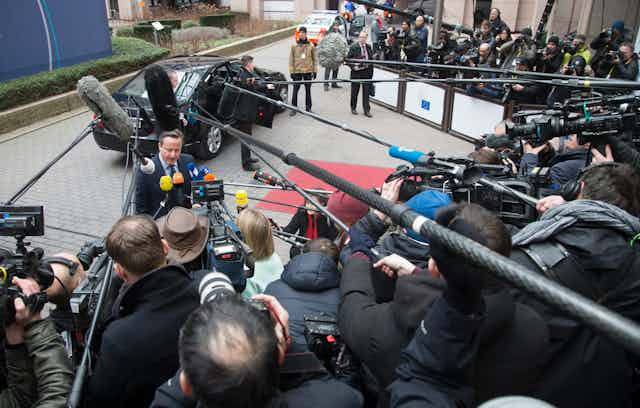It’s fair to say without exaggeration that from the beginning, the United Kingdom has been the enfant terrible of the European Union.
The UK famously withdrew from negotiations on the Treaty of Paris, which gave birth to the EU’s first incarnation, the European Coal and Steel Community, in 1951. It also declined to join the European Economic Community (EEC) and European Atomic Energy Community in 1957 at the Treaty of Rome.
It’s true that the then French president Charles de Gaulle’s double veto of the UK’s entry into the community in 1963 and 1967 did not help matters; but ever since the UK finally joined the EEC on January 1 1973, it has been a member state like no other.

This is because, for the UK, European construction is merely an economic project. It is absolutely not a political project, let alone geopolitical, as Margaret Thatcher made clear in her speech to the College of Europe in 1988.
So it is not surprising that today, the UK prime minister David Cameron, under increasing pressure from Eurosceptic members of his party, wants a renegotiation of terms that allows his country to cement its special status, with the support of the British people.
Cameron has four formal requests, all in direct opposition to the founding principles of the union, which he says must be fulfilled for him to support the British people to vote to remain in the European Union. His requests relate to economic governance and integration of the euro area; competitiveness; sovereignty; and social benefits for migrant workers.
A member state like no other
Are we in the rest of Europe not entitled to say that the UK is not a full member state – that it has one foot in the European Union and one foot out?
February’s draft decision of the heads of state and government, reached by the European Council regarding a new arrangement for the UK, is instructive in this regard. It lays out the extent to which the UK has already been accommodated within the union.
Recalling in particular that the United Kingdom has already been entitled under the Treaties:
not to adopt the euro and therefore to keep the British pound sterling as its currency,
not to participate in the Schengen acquis,
to keep exercising border controls on persons, and therefore not to
participate in the Schengen area as regards internal and external borders,to choose whether or not to participate in measures in the area of freedom, security and justice,
to cease to apply as from 1 December 2014 a large majority of Union acts and provisions in the field of police cooperation and judicial cooperation in criminal matters adopted before the entry into force of the Lisbon Treaty while choosing to continue to participate in 35 of them.
Without being too exhaustive, it’s worth mentioning that on top of this, the United Kingdom rejected the European Stability Mechanism and the Treaty on Stability, Cooperation and Governance.
Game, set, match?
In understanding the UK’s position, it’s useful to recall the words of past prime ministers of Her Majesty. In 1989 Margaret Thatcher famously declared: “I want my money back”, securing a budget rebate for her country.

Equally famous is her successor John Major’s comment that the Maastricht Treaty of 1991, which established the euro, was won “game, set and match” for Britain because it contained an option for member states to opt out of the shared currency – which the UK ultimately did.
Still, dissatisfied with the tailored suit the UK has been given by its European partners, David Cameron wants to impose new conditions on the 27 other member states. He intends to do this in a political pas de deux: renegotiation followed by a referendum.
In 1975, James Callaghan, then British foreign secretary did the same thing. Following requests for “a fundamental renegotiation” of the terms of membership, he submitted the question of whether to stay in the EEC to UK voters. The result was 67% in favour of maintaining the UK’s membership of the EEC, but the spectre of a Brexit was nevertheless raised for the first time. Forty years later, David Cameron will repeat the process.
The UK intends to denounce the federalist evolution of the EU and rearrange the conditions of membership. The British have already taken maximum precautions when preparing the Treaty Establishing the European Constitution, requiring that the word “federal” does not appear.
This position is based on the Lisbon Treaty, which was the first to refer to the prospect of a member exiting the EU. Withdrawal of any state thus appears as both the law of a member state but also as the right of a people. This confirms the dual nature of the EU – as a union of states and a union of citizens. But the UK wants it to become a loose confederation in order to weaken it.
Exorbitant demands
Undoubtedly, the UK is a difficult European partner. It repeatedly and systematically seeks to safeguard its own national interests and to minimise its participation in the European Union.
In the draft agreement we have so far, the EU is expected to renegotiate treaties not by going through a review process, but through blackmail at the hands of the UK, which no longer seems adhere to European values. The concessions made to the UK to avoid a Brexit are exorbitant because they undermine the very foundations of European integration and are likely to have a ripple effect for other states members.
The malaise of the UK should not allow David Cameron to stand in the way of integration, or worse, engage in the deconstruction of the union.


